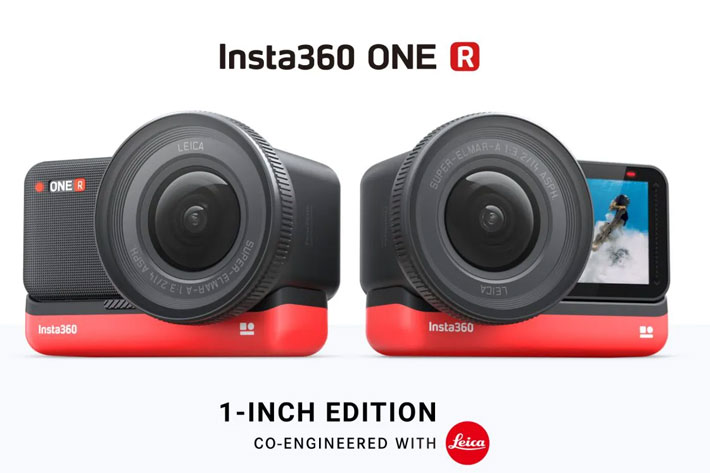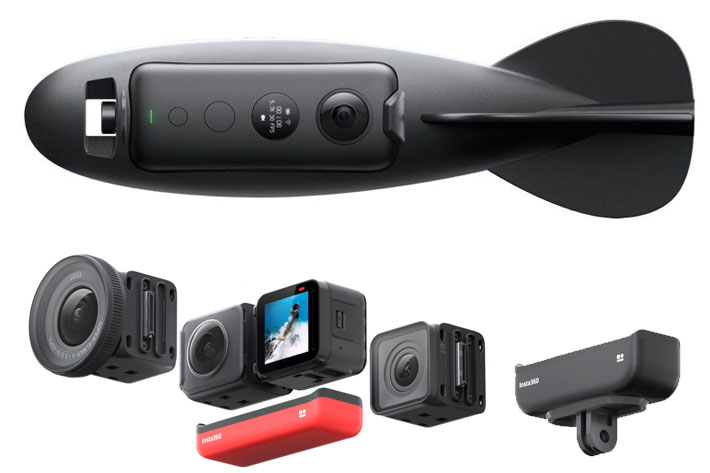
Co-engineered with Leica is a catchy phrase that helps to promote a product, so the new Insta360 ONE R uses it, to sell a modular camera that reminds me the Ricoh GXR… which lasted a couple of years.
Insta360 is not a new name to the market, and ProVideo Coalition has mentioned the company before, when presenting the Insta360 Nano S, a 4K 360 video camera for iPhone, and theInsta360 ONE X, the 360-degree action camera you can throw around. This last model, announced in October 2018, was introduced as the as the future of the action camera, but apparently the company has decided otherwise, and now the Insta360 is about to take that task.
Recently introduced to the market, the Insta360 ONE R picks many of the ideas and features of the Insta360 ONE X that Iam not going to bother rewriting them all here, sending readers, instead, to the article PVC published before. The description to the Insta360 ONE X is similar, in many points, from being able to be a “silent drone” to go underwater.

From a fish-like design to LEGO bricks
The difference is that while the Insta360 ONE X had a fish-like shape (or zeppelin) with the Drifter attachment, and could be thrown around, the Insta360 ONE R is built of different blocks – one battery, one processor and a selection of quick-swapping lens Mods – that allow it to change from a a dual-lens 360 shooter to a standard action cam. According to Insta360, the ONE R currently offers three ways to shoot with three available lens Mods — the Dual-Lens 360 Mod, the 4K Wide-Angle Mod and the 1-Inch Wide Angle Mod co-engineered with Leica.
https://youtu.be/b8dsssSi4Aw
So, that’s the part where Leica comes in. The announcement of the cooperation coincided with the launch of the Insta360 ONE R, which is, “an adaptive action camera that uses a unique interchangeable camera module to combine the creative freedom of 360-degree capture with the precision and resolution of traditional single-lens shooting.”
Leica Camera AG and Insta360 partnership aims to bring true innovation and state-of-the-art imaging quality to the action camera and 360-degree camera spaces. The 1-Inch Wide Angle Mod, which is the first result of that cooperation, achieves, says Insta360, “the best performance ever in an action camera, combining a 1-inch sensor with the legendary optical expertise of Leica and 5.3K resolution — in a compact, rugged body backed by Insta360’s signature FlowState stabilization.”
Co-engineered with Leica
Also according to the information available, the premium Insta360 ONE R 1-Inch Edition sensor allows creators to achieve image quality and dynamic range never before seen in an action cam, together with Insta360’s signature FlowState stabilization. This 5.3K wide-angle lens can be instantly swapped for a dual-lens setup that captures action in all directions at once and unlocks a range of creative techniques only possible with a 360-degree field of view.
‘With Insta360, we have found the right partner to bring the decades of Leica optical and digital imaging expertise into a new product segment. We think that Insta360 has an extremely high level of know-how in the software sector – especially in the field of 360-degree acquisition technologies. The aim of our cooperation is to develop innovative technologies under the highest image and quality standards, trying to push the limits of what is technically possible’, says Matthias Harsch, CEO of Leica Camera AG.
JK Liu, Insta360 Founder, said: “For more than a century, Leica has never stopped pushing the boundaries of what’s possible with a camera, and it’s never lost sight of a guiding ethos of craftsmanship and quality that inspires photographers to push their own work further. They are the ideal partners to join us in perfecting a new generation of cameras that serve users at every step of the creative process — from capture to editing to sharing. Combining the expertise in optics and imaging design of Leica with Insta360’s unique portfolio of innovations, including gimbal-free stabilization and smart editing software, will allow both brands to redefine categories and realize the potential of new camera formats and modes of capture.”
An affordable entry-level module
The adaptative or modular Insta360 ONE R, which looks like bricks of Lego that you can assemble together to create cameras for different situations is an interesting concept, at least on paper, but it has hardly survived in the real world, so I don’t really know if this “innovation” will be even remembered when the next CES happens. In the end, the Insta360 ONE R is, no doubt a versatile action camera, which takes further some of the good ideas already present in previous models from the company… even without Leica’s participation.
Price wise, the camera is affordable, as the Insta360 ONE R 4K Edition offers creators all they need to enjoy the versatile 4K Wide Angle Mod for $299.99. Those looking for more options can go for the Insta360 ONE R Twin Edition, which brings together two great ways to shoot — the Dual-Lens 360 Mod and 4K Wide Angle Mod — in one convenient package for $479.99. Finally, the Insta360 ONE R 1-Inch Edition comes standard with the premium 1-Inch Wide Angle Mod co-engineered with Leica, and retails for $549.99.
Remember Ricoh and Rollei
According to Insta360, the “ONE R doesn’t stop at three Mods. Its unique design enables a huge range of efficient add-ons and upgrades. The standard Battery Base can be swapped for a double-size Boosted Battery Base for extended shooting.”
Cameras like the Insta360 ONE R always make me remember the Ricoh GXR experience, from 2009, which was a system based on interchangeable units, each housing a lens, sensor and image processing engine. The idea was great on paper, but production of the Ricox Modular Camera System modules ended in 2011 – Ricoh, though, never announced officially that the GXR is dead – , a clear suggestion that even the brightest ideas on paper do not survive in the real world. Being old enough to remember other examples, I have to point readers to a modular system that fascinated me: the Rolleiflex SL2000F.

